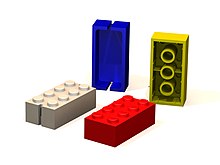Construction set
This article has multiple issues. Please help improve it or discuss these issues on the talk page. (Learn how and when to remove these messages)
|



60 Fullerene.





A construction set is a standardized piece assortment allowing for the construction of various different models. Construction sets are most often marketed as toys. Popular construction toy brands include Lincoln Logs and LEGO.
Toys
[edit]Psychological benefits
[edit]Construction toy play is beneficial for building social skills and building trust in others because it acts as a collaborative task where individuals have to cooperate to finish the task – building an object out of Lego, for example. The effect was found in high school students.[1]
For children specifically, children who complete models using toy building blocks have much better spatial ability than children who do not complete such models. Spatial ability also predicts completion of models.[2]
Construction toy play is also beneficial for autistic children when both individual and group play with building blocks is incorporated. Autistic children who played with building blocks were motivated to initiate social contact with children their age, able to maintain and endure contact with those children, and were also able to surpass the barriers of being withdrawn and highly structured.[3]
Lego health concerns
[edit]Red and yellow Lego building blocks, which were manufactured between 1963 and 1981, can release carcinogenic cadmium when exposed to stomach acid in amounts exceeding today's limits about 10-fold.[4][5]
Categories
[edit]Construction sets can be categorized according to their connection method and geometry:
- Struts of variable length that are connected to any point along another strut, and at nodes.
- Tesseract connection points are initially flexible but can be made rigid with the addition of clips.
- Struts of fixed but multiple lengths that are connected by nodes are good for building space frames, and often have components that allow full rotational freedom.
- D8h (*228) nodes are used for K'Nex, Tinkertoys, Playskool Pipeworks, Cleversticks and interlocking disks in general.
- D6h nodes are used for interlocking disks.[6]
- Ih (*532) nodes are used for Zometool
- Panels of varying sizes and shapes
- Panels of varying sizes and shapes are connected by pins or screws perpendicular to the panels, which are good for building linkages such as an Erector Set, Mini Unit Beams, Meccano, Merkur, Steel Tec, Lego Technic, Trix, FAC-System, Constructo Straws, and Überstix
- Panels of varying sizes and shapes with flexible panels or hinges between panels such as Tog'l, Jovo Click 'N Construct, Zaks, and Polydron.
- Struts and panels
- Girder and Panel building sets
- Synestructics (does not make pentagonal structures)
- Ramagon (some panels include studs for connecting with Lego clones)
- Geomag (components are magnetic)
- Bayko
- Building components with various methods of connection include:
- No connection: toy blocks, Anchor Stone Blocks, KEVA planks, Kapla, and Unit Bricks
- Studs: Engino, Rokenbok, Lego, Lego clones, Coco, Rasti, Tente, Mega Bloks, Fischertechnik, Playmobil, Loc Blocs, Cobi blocks, Betta Builda, Guangdong Loongon (and its subbrands: Cogo, Lepin, Xingboa) and Oxford, Kre-O, Clementoni mechanics.
- Notches: Lincoln Logs, GIK, and Stickle bricks
- Sleeves: Capsela
- Spherical magnets
- Many marble run toys are construction sets.
Influence on architecture
[edit]Renowned architect Frank Lloyd Wright credited his childhood building blocks designed by Friedrich Fröbel as a major influence, and his son John Lloyd Wright invented the widely-known Lincoln Logs building set.[7] In addition to teaching architectural concepts such as modularity and load-bearing construction,[8] many architects credit construction set play as influencing their later design.[9][7][10]
See also
[edit]- Pontiki, construction toy for building models of unusual creatures
- Unit block
References
[edit]- ^ Kato, D.; Hattori, K.; Iwai, S.; Morita, M. (2012). "Effects of collaborative expression using LEGO blocks, on social skills and trust". Social Behavior and Personality. 40 (7): 1195–1200. doi:10.2224/sbp.2012.40.7.1195.
- ^ Brosnan, M. J. (1998). "Spatial ability in children's play with Lego blocks". Perceptual and Motor Skills. 87 (1): 19–28. doi:10.2466/pms.1998.87.1.19. PMID 9760621. S2CID 22808504.
- ^ LeGoff, D. B. (2004). "Use of LEGO© as a Therapeutic Medium for Improving Social Competence". Journal of Autism and Developmental Disorders. 34 (5): 557–571. doi:10.1007/s10803-004-2550-0. PMID 15628609. S2CID 9889621.
- ^ Reinhard Wolff (2018-02-12). "Wo ist der grüne Klotz?" [Where is the green block?]. Die Tageszeitung (taz) (in German). Retrieved 2021-02-04.
Schadstoffbelastung in Legosteinen (Pollutant load in Lego bricks)
- ^ Andrew Turner (2018). "Concentrations and Migratabilities of Hazardous Elements in Second-Hand Children's Plastic toys". Environmental Science & Technology. 52 (5): 3110–3116. Bibcode:2018EnST...52.3110T. doi:10.1021/acs.est.7b04685. hdl:10026.1/11188. PMID 29350926.
- ^ Kondinski, A.; Moons, J.; Zhang,Y.; Bussé, J.; De Borggraeve, W.; Nies, E.; Parac-Vogt, T.N. (2019). "Modeling of Nanomolecular and Reticular Architectures with 6-fold Grooved, Programmable Interlocking Disks". Journal of Chemical Education. 97: 289–294. doi:10.1021/acs.jchemed.9b00739. S2CID 208759028.
- ^ a b Heathcote, Edwin (9 August 2013). "Toytown and the city". Financial Times. The Financial Times Limited. Archived from the original on 15 August 2013. Retrieved 17 December 2013.
- ^ Stewart, Matt (12 June 2013). "Modern toys curb creativity – academics". Stuff.co.nz. Fairfax New Zealand Limited. Archived from the original on 19 December 2013. Retrieved 17 December 2013.
- ^ "Hurtownia zabawek w Wólce Kosowskiej". Retrieved 14 July 2023.
- ^ Anthony, Christopher. "Quelle Kindersuche". Children playground. Retrieved 15 March 2023.
